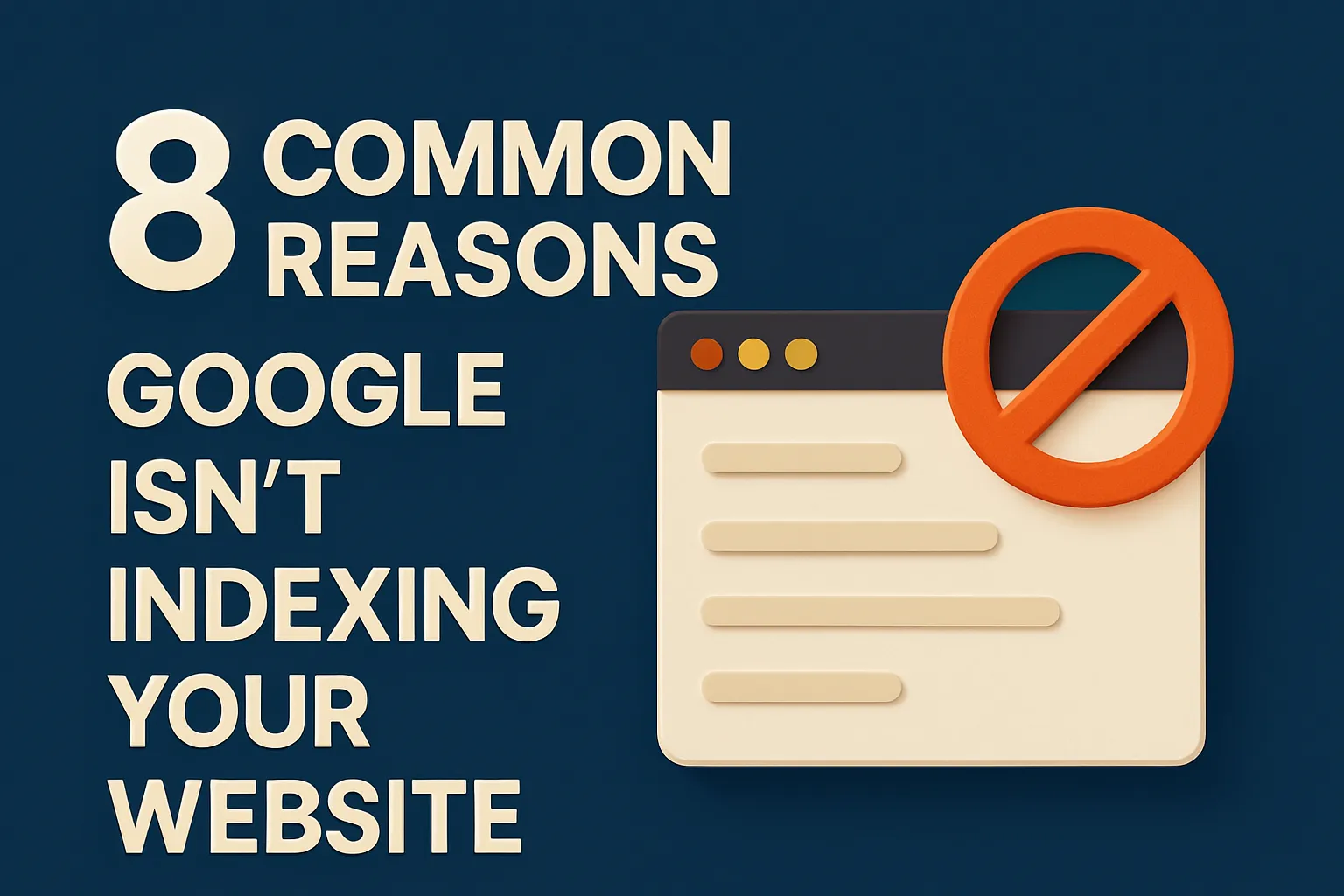8 Common Reasons Google Might Not Be Indexing Your Website Pages

Senior WebCoder

It’s frustrating — you’ve launched your site, published your content, and waited patiently. Yet, when you search on Google, your pages don’t appear. What’s going on?
Indexing issues are more common than you might think, and often, the culprits are right under your nose. In this post, we’ll walk you through eight specific reasons why your web pages may not be getting indexed by Google — and what you can do to fix them.
1. 🏷️ You Might Be Using a “No-Index” Tag
Sometimes, developers intentionally add a noindex meta tag to keep search engines away from certain pages (like admin panels or thank-you pages). But if it accidentally ends up on important pages, Google won’t index them — no matter how great the content is.
✅ What to do:
Use tools like Screaming Frog or check “View Page Source” in your browser. If you see <meta name="robots" content="noindex"> on a page that should appear in Google, remove it right away.
2. 🔗 Orphan Pages with No Internal Links
An orphan page is like a forgotten island — it exists, but nothing points to it. Without internal links leading to it, Google’s bots might never find it.
✅ What to do:
Run a site audit to spot orphan pages. Then, link to them from other relevant, high-traffic pages to guide both users and crawlers.
3. ✍️ Content That’s Too Thin or Low-Quality
Google favors content that delivers real value. Pages that are too short, copied from elsewhere, or lack originality are less likely to get indexed.
✅ What to do:
Audit your content. Ask yourself: Does this page offer something unique? If not, enhance it with original ideas, clear structure, useful images, or actionable insights.
4. ⚠️ Crawl Errors Are Blocking Google Bots
Server errors (like 5xx), redirects (3xx), or missing pages (404s) can frustrate Google’s bots. If your site returns too many of these, Google might stop trying.
✅ What to do:
Go to Google Search Console → Coverage. Fix broken links, resolve server downtime, and ensure your key pages return a clean 200 status.
5. 🛑 Robots.txt Might Be Blocking Key Pages
Your robots.txt file controls what Google can and can’t crawl. A small mistake here can accidentally block entire sections of your site.
✅ What to do:
Visit yourdomain.com/robots.txt. Check for lines like Disallow: / or Disallow: /blog/. Make sure no important pages are restricted unintentionally.
6. 🗺️ Sitemap Issues Are Hurting Discoverability
Think of your sitemap as a map for Google. If it’s outdated, incomplete, or missing altogether, your site will be harder to explore.
✅ What to do:
Create and submit your sitemap in Google Search Console. Use tools like Yoast SEO or XML Sitemaps Generator and ensure all key URLs are included.
7. 📱 Poor Mobile Experience (Mobile-First Indexing)
Google uses your site’s mobile version as the primary version for indexing. If your mobile UX is broken, missing content, or slow — Google might ignore it.
✅ What to do:
Use Google’s Mobile-Friendly Test to identify issues. Ensure responsive design, readable fonts, and full content visibility on mobile devices.
8. 🔄 Crawl Budget Waste on Unimportant Pages
Google limits how many pages it crawls on large sites. If your crawl budget is wasted on login pages, filter URLs, or duplicate content — your important pages might never be reached.
✅ What to do:
Block non-essential pages (e.g., /admin, /search, /filter) using robots.txt or meta noindex. Focus internal links and crawl paths on content that truly matters.
🧩 Final Thoughts: Indexing Is More Than Just Submitting a Page
Just hitting “publish” isn’t enough. If Google can’t find, crawl, or understand your pages — they won’t show up in search.
By tackling the above issues, you’ll dramatically increase your chances of showing up where it matters — in front of your audience.
✅ Bonus: Quick Fix Checklist
| Issue | Recommended Fix |
|---|---|
| Noindex tag | Check & remove from key pages |
| Orphan pages | Add internal links |
| Thin content | Improve with value-driven updates |
| Crawl errors | Fix broken links, 3xx, 4xx, 5xx |
| Robots.txt | Audit to avoid accidental blocking |
| Sitemap | Create, validate, and submit to GSC |
| Mobile-first problems | Optimize mobile UX and responsiveness |
| Crawl budget limits | Block irrelevant pages using robots/meta tags |
📌 Need help with SEO audits, indexing strategies, or technical fixes? Reach out to the FUEINT Team — we help businesses stay visible in search!

Soundiraraj Moorthy
Senior WebCoder
Soundiraraj Moorthy is a Senior WebCoder at FUEiNT, contributing expert insights on technology, development, and digital strategy.
